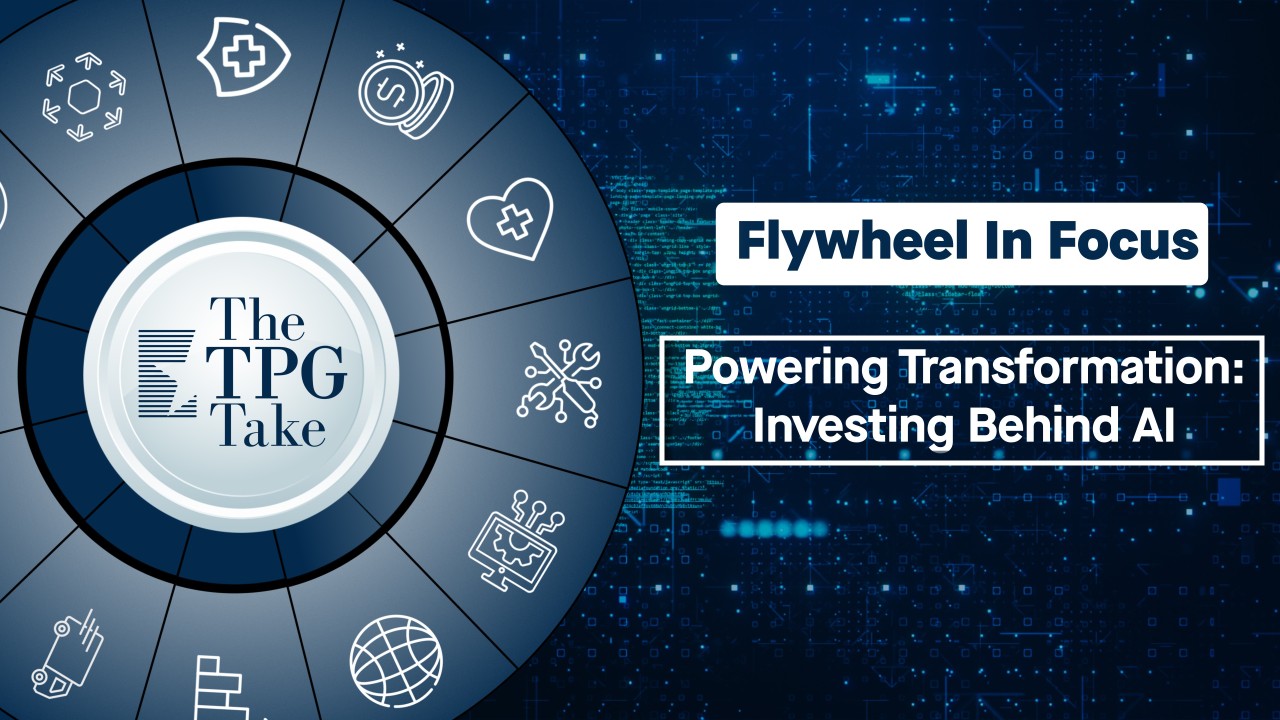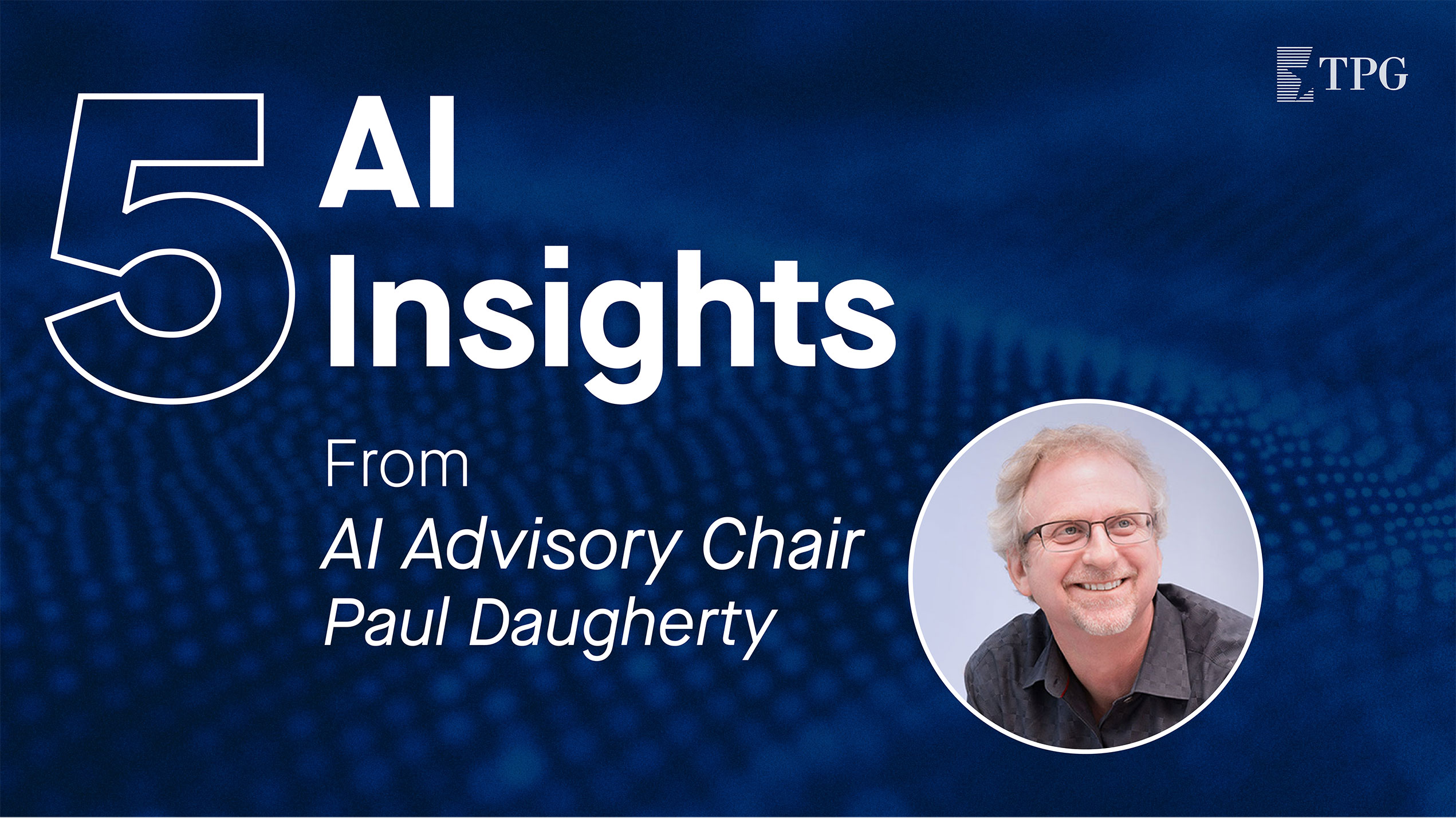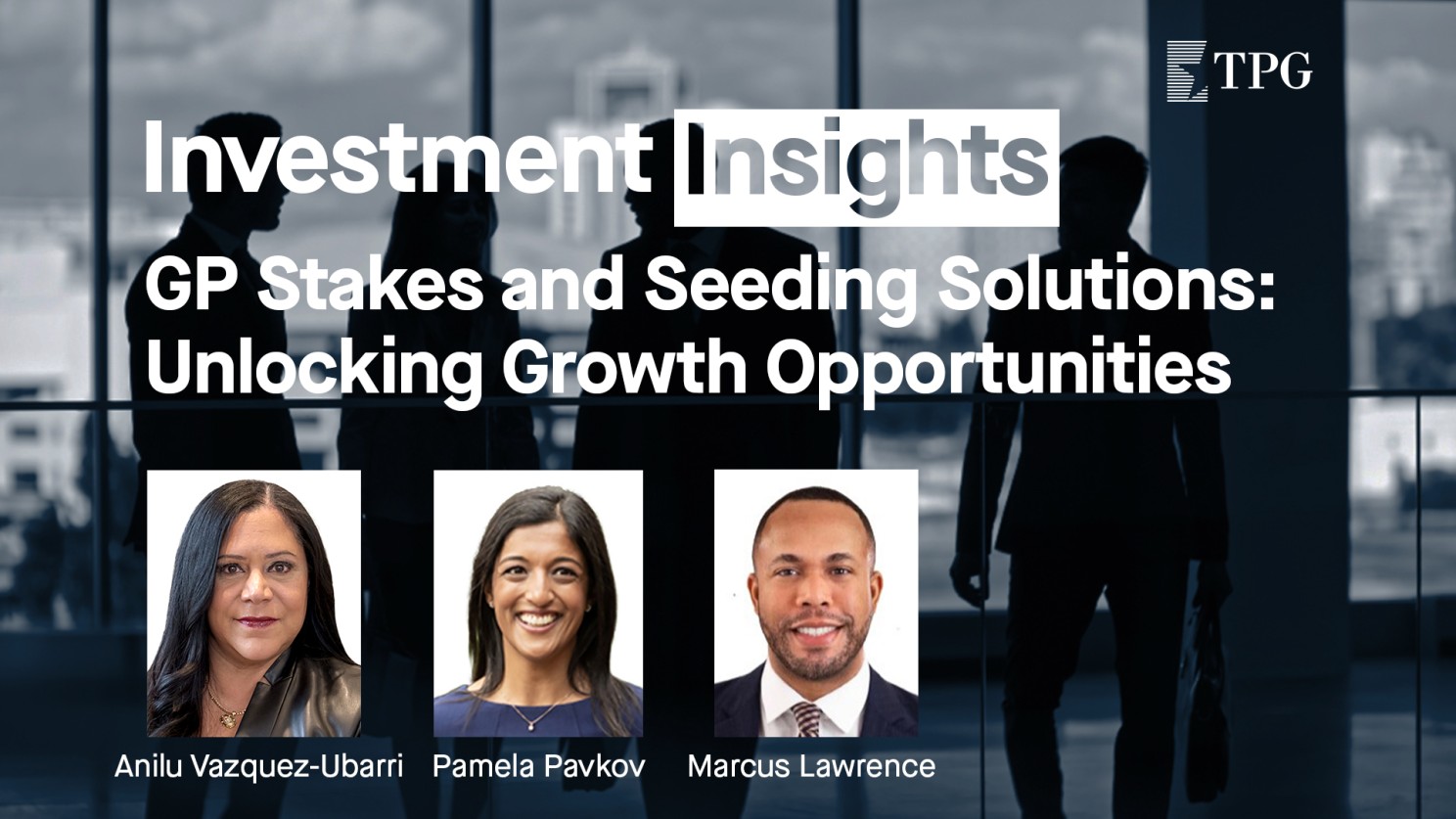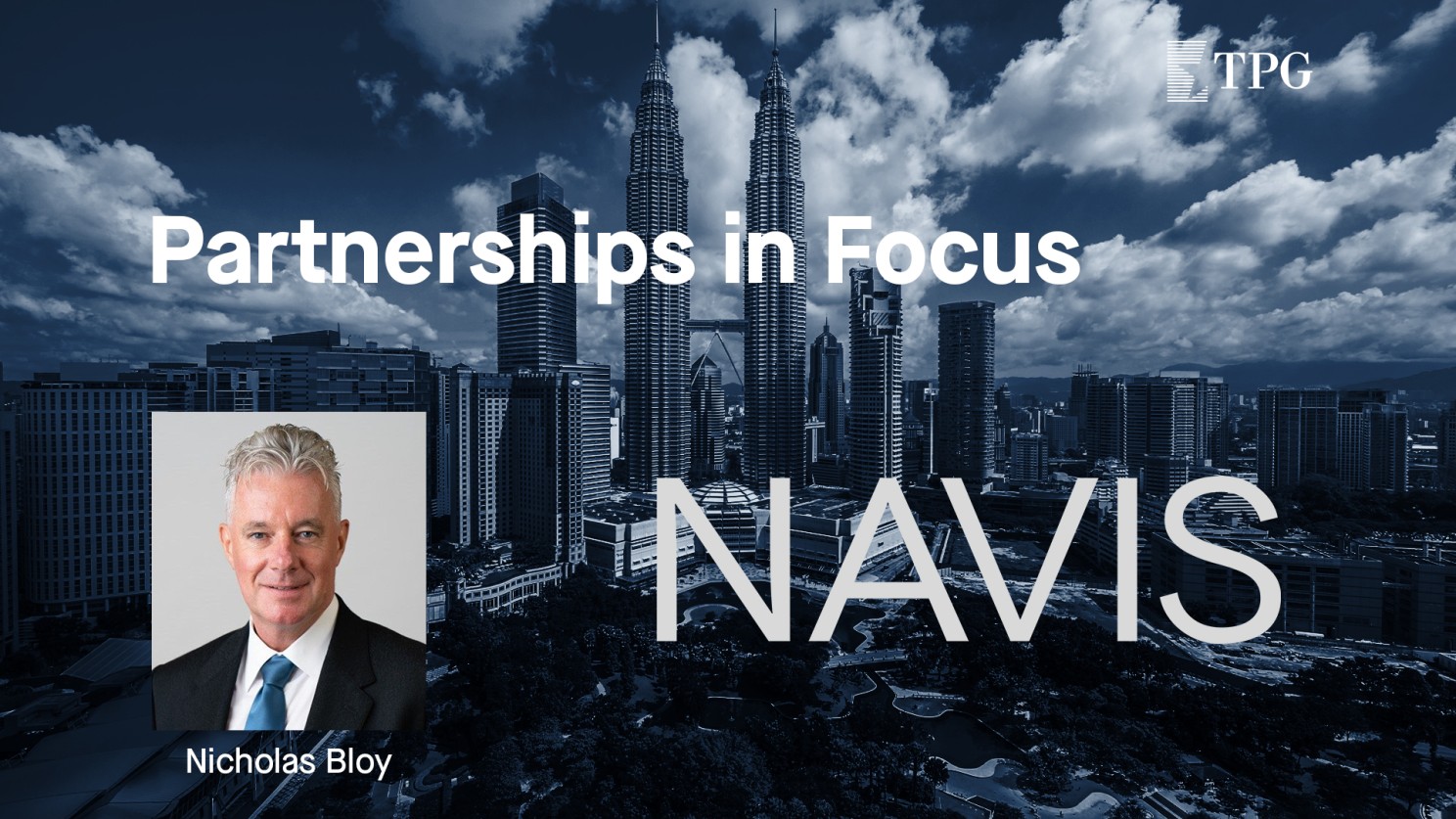
July 2025, Issue #13
Flywheel in Focus: Powering Transformation - Investing Behind Artificial Intelligence
In our latest edition of The TPG Take x Flywheel in Focus, leaders from across the firm share their insights into how AI is transforming industries and driving innovation across our portfolio.
We explore how AI is shaping opportunities – from enabling efficiency and automation, to redefining customer experiences, and unlocking value across sectors – and the role private capital can play in supporting the AI revolution.
Note: the below is an edited transcript of interviews with leaders across the firm. For more please be sure to watch the full video chapters below.
Powering Transformation: Investing Behind AI
Art Heidrich: "Our focus on AI is very aligned with how we think about thematic investing. It's really about understanding the use cases and applications, and where it can drive a huge amount of customer efficiency and ROI."
Mike Zappert: "We think about AI across two main lenses. First is offense: how can AI allow us to access new markets or customer opportunities, or grow companies more quickly over time? The next is defense: what are the different ways that we could be potentially disrupted? And then how do we leverage those lessons and better position companies over time?"
Tim Millikin: "As investors, we have to be thinking about not only what’s happening today, but really over the long term. We think about the technology itself that is supporting and enabling AI in digital transformation – everything from the underlying models, to applications that are being built on top, to the surrounding services ecosystem."
Nehal Raj: "AI is going to impact all industries and all geographies –everything from data centers in our Real Estate fund, to electric power in our Climate fund, to big business services companies in our private equity funds. So, looking at all of that holistically, I think, is really important at a firm with the scale that we have at TPG."
AI Adoption in Business Services & Software
Nehal Raj: "One of our most interesting ways of investing is through transformations, where we are fundamentally changing the companies that we're investing in. And what I'm most excited about with respect to AI is its ability to aid, and in some cases accelerate, those transformations. One of our most prevalent AI investment themes is the ability to use AI to transform business services companies."
Robert Roley: "AI has enabled efficiency across areas like finance, HR, and IT, but we're also seeing a lot of innovation in product. For example, adding AI-assisted copilots or infusing AI into products and services to make them more competitive. We also see AI having a major impact on companies' go-to-market strategy, whether it's getting more creative and effective at content creation, or better enabling a sales force by using AI to unlock customer insights. All these areas within a software business are being positively impacted by AI, if companies have the urgency and capability to take advantage of it."
Mike Zappert: On Agentic AI... "By having an agent, you can give them the broad parameters of what you want to accomplish in the same way that you would work with a colleague or coworker. We think that transition is going to be really important for a lot of horizontal software applications. Over time you're going to see incumbents start to leverage agentic AI, and the providers that allow them to do that are, in our view, a very interesting area to focus on."
AI Adoption in Cybersecurity
Robert Roley: "Another compelling theme for us right now is what we call AI for security and security for AI. We're looking at companies that can not only capitalize on AI, but help companies operate more confidently in an era of AI."
Tim Millikin: "For example, we own a business called Delinea in the identity security space, who are really on the forefront of AI adoption within cybersecurity. First, they are protecting not only human identities, but machine-based and agentic AI-based identities. There's a tremendous amount of demand for their products and solutions as enterprises struggle to handle the proliferation of AI-based agents. At the same time, they're also infusing AI into their products to give their customers better insight, leveraging the data they already have to be able to more effectively protect those businesses."
AI Adoption in Cybersecurity
Art Heidrich: "As we think about our approach to AI, it really starts with the customer, and how AI can enable a better experience that drives ROI. There's huge efficiency opportunities around healthcare, which has an estimated $750 billion dollars of fraud, waste, and abuse, totaling between 20-30% of the overall amount spent in healthcare each year. So, if AI and automation can lead to better application of data to patients and treatments, ultimately, that should lead to higher-quality care at a much lower cost.
Nextech and WellSky are both electronic medical record and practice management vendors implementing AI. Historically, the physician and patient interaction has been suboptimal in terms of building a relationship while having to type notes into a computer. Now with ambient listening, AI can transcribe those conversations in real time into the EMR, which results in a much better patient experience. It also drives a huge amount of efficiency for the physician, so it's an opportunity we're quite excited about."
AI Adoption in Impact Investing
Steve Ellis: "We're focused in domains where AI is going to be transformative in changing the value proposition and the competitive position of a certain segment of the industry. For example, with the advent of AI, there's an opportunity to completely disrupt the way that enforcement of public safety is done today.
We've recently invested in a company called Hayden AI, who has developed an AI-enabled, computer vision system mounted inside a municipal bus. And what it does is it identifies various problems for public transportation and safety, automates the process of identifying those violations, and, ultimately, issues a ticket to the violators. It's a great example of something that generates more revenue for the city, and has enormous public safety and environmental benefits."
Elsewhere across TPG's Impact Platform, TPG Rise Climate is investing in the innovative companies delivering cleaner and more abundant power to the data centers behind the AI transformation. We are actively deploying into a sector that is experiencing a step change in both demand for energy addition and energy security. We are focused on investing behind the climate solutions that serve these forces and act as picks and shovels for broader AI adoption.
Miratech, a TPG Rise Climate portfolio company, engineers and manufactures emissions and noise reduction technology for the mission-critical power generators that help keep data centers online. And our innovative partnership with Google and our portfolio company Intersect Power will provide scaled renewable power and storage solutions to new data centers across the US – delivering gigawatts of new data center capacity and catalyzing a targeted $20 billion in renewable power infrastructure investment by the end of the decade.
The Role of Credit Markets in the AI Revolution
Ryan Mollett: "How do you create innovative financings in order to ensure that your downside is protected, you get a very attractive return, and you're not taking the risk of technological obsolescence? I think there are two things that are going to define the winners in this space – data and access to capital."
We're seeing hyperscalers looking for over $300 billion of capital in 2025 alone, as well as a requirement for $5 trillion worth of capital over the next five years. There needs to be innovation from a financial aspect that is commensurate with the technological innovation that we're seeing in the market today.
Having a fully integrated product suite – from private equity through corporate credit and into structured credit – is going to come into play as you marry asset-backed securities with preferred equity, regular corporate capital structures, and construction financing, for instance. From building out the infrastructure and the data centers to funding the compute, there's just so much capital that is needed to go into this space. And that means there's a lot of opportunities."
Mike Ginnings: "TPG's history in technology investing has put us in a great position to be active. While AI is a specialist theme, it also requires a broad and diverse set of skills. You need to have technology sector expertise, which we have through our credit and private equity businesses; you need digital infrastructure expertise, which is the underpinning of these companies; and you need structured credit expertise, which is going to large-scale fund many of these projects. On top of that, you have to bring all of that together under one roof where everyone is collaborating and analyzing the best opportunities."
What Sets TPG’s AI Strategy Apart?
Nehal Raj: "AI investing is very capital-intensive. And TPG is very well-positioned to help in this area because we are providers of everything from equity capital, all the way to debt capital. And so, if you think about the billions of dollars needed to be invested in data centers or AI infrastructure, it can come in many forms. When we're meeting with companies, we're able to offer them an entire menu of ways that we can help from a capital perspective, as well as being an overall thought partner.
Finally, we're here in San Francisco, which gives us a huge advantage as the majority of the AI innovation is happening within walking distance of our headquarters."
TPG AI Initiative: Transforming the way we work
Tim Millikin: "AI presents an opportunity for us to completely transform everything that we do. The TPG AI initiative crosses the entire firm and is incredibly important as we advance into this next decade of innovation. And so, we've assembled a group of people from across the firm to look at AI from every angle:
- How are we investing? What are the themes we're investing behind?
- How are we reinventing our portfolio operations team to help drive AI-based transformations?
- How are we changing the way that we work?"
Rob Graffeo: "We've been studying AI for quite some time, and a lot of our capability is centered around a team called Lab 39, originating in 2019 as a traditional data science group. As we moved up the maturity curve, we got very deep into deep learning machine learning (ML), which is a great underpinning for a lot of our predictive analytics where we can tease out better intuition and responses from the language models.
Our goal is to stay ahead of this AI curve, and I think we're well-positioned because the platform that we've put together around our ML capability, our ability to evaluate third parties, and the fact that our internal capability, which we call Samantha, is very true to the description of an agentic framework.
It's not a replacement for people and decision-making, but it's an accelerator for idea generation. One of the unique things we do with our Lab 39 AI capability is we spend significant time with a number of portfolio companies. We've had the opportunity to build bespoke machine learning models for them, coach them, and help brainstorm where they want to take their AI use cases, which, I think, is something that differentiates us in the marketplace."
ICYMI: Other News & Views from TPG...
We are excited to welcome Paul Daugherty to TPG as our AI Advisory Chair! In his role, Paul will help scale AI initiatives across TPG’s investment strategies, portfolio value creation, and internal innovation. Paul brings decades of experience in AI development, deployment, and advisory, having spent 38 years at Accenture, where he held roles including CEO of the Technology Group and Chief Technology and Innovation Officer, helping transform the firm into a global leader in technology services. Hear Paul's latest AI Insights.

In the latest in our Investment Insights series, we hear from TPG COO Anilu Vazquez-Ubarri, TPG NEXT Managing Partner Pamela Pavkov, and Principal Marcus Lawrence on the growth and evolution of TPG NEXT, the firm’s GP seeding and staking strategy, and opportunities embedded within the emerging manager ecosystem. They discuss the complexities of launching and building an investment firm, the growth of the seeding and staking category, and TPG NEXT’s customized partnership approach to help new firms succeed in a competitive market and de-risk their success.

In this episode of Partnerships in Focus, we sit down with Navis Capital Partners’ Co-Founder and Managing Partner, Nick Bloy. Nick discusses the partnership evolution with TPG NewQuest, and why Navis chose to partner with TPG NewQuest for a second time to raise a $230 million continuation fund to support affordable K-12 education assets in Southeast Asia.

Thank you to all of our followers and readers for joining us for another edition of The TPG Take. Please share the newsletter with anyone you think would be interested and we look forward to being back in your inboxes.

TPG
345 California St suite 3300, San Francisco, CA 94104, USA
Important Disclosures
This material is solely for informational purposes and shall not constitute an offer to sell or the solicitation to buy securities. The opinions expressed herein represent the current, good faith personal views of the author(s) at the time of publication, and do not necessarily represent the views of TPG, its affiliates, or any of its investment professionals. The opinions expressed herein are not definitive investment advice and should not be relied on as such. The information presented herein has been developed internally and/or obtained from sources believed to be reliable; however, TPG does not guarantee the accuracy or completeness of such information. We provide links to third party websites only as a convenience and the inclusion of such links does not imply any endorsement, approval, investigation, verification or monitoring by us of any content or information contained within or accessible from the linked sites. If you choose to visit the linked sites you do so at your own risk, and you will be subject to such sites' terms of use and privacy policies, over which TPG has no control. In no event will TPG be responsible for any information or content within the linked sites or your use of the linked sites. Predictions, opinions, and other information contained in this material are subject to change continually and without notice of any kind and may no longer be true after the date indicated. Any forward-looking statements speak only as of the date they are made, and TPG assumes no duty to and does not undertake to update forward-looking statements. Forward-looking statements are subject to numerous assumptions, risks and uncertainties, which change over time. Actual results could differ materially from those anticipated in forward-looking statements.
